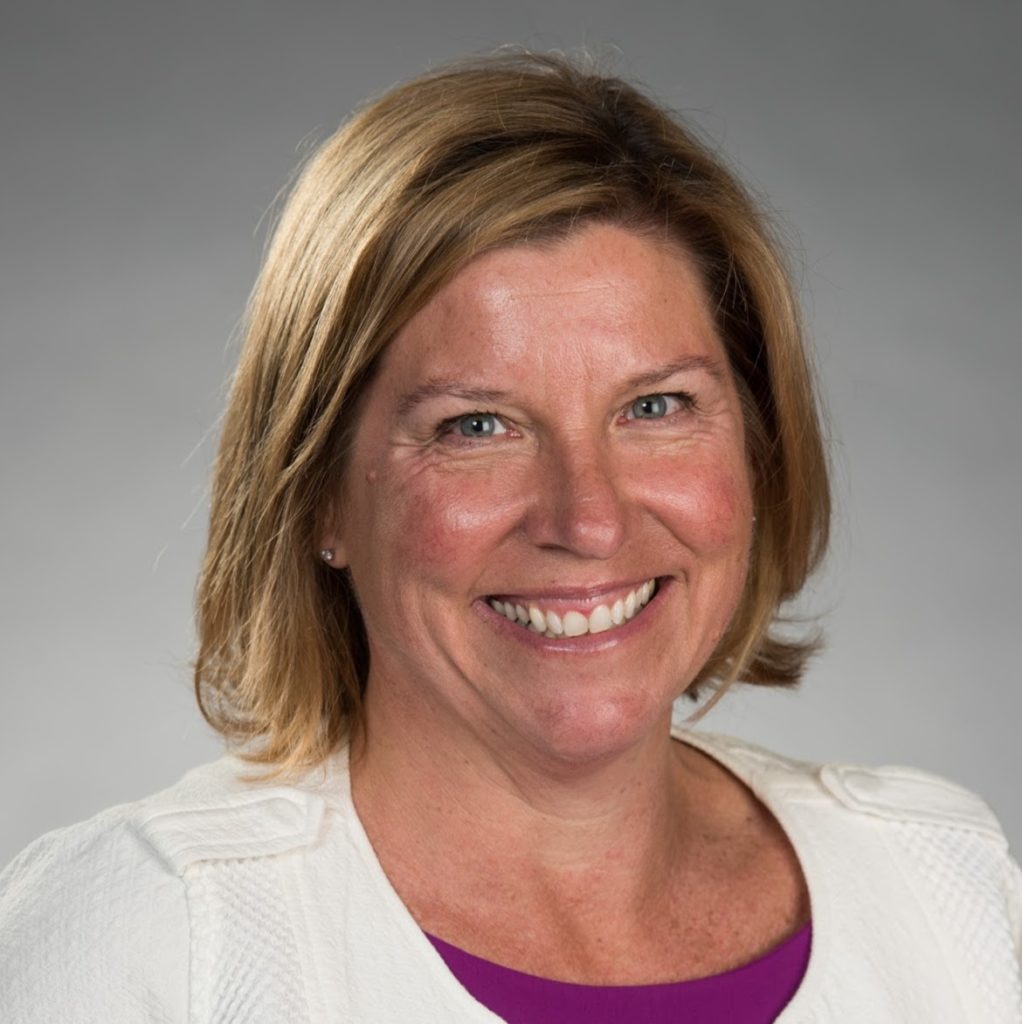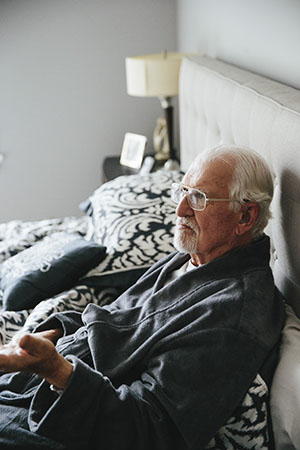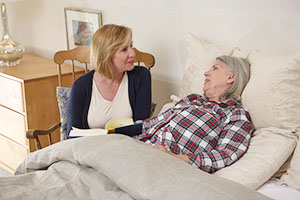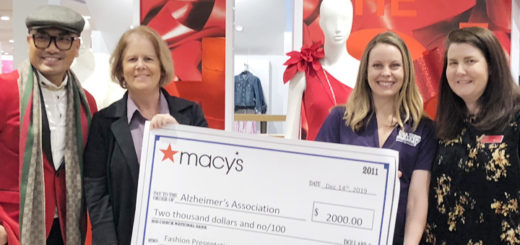Advocating for the rights of people with dementia during COVID
By Susan DeMarois
Susan DeMarois, Director of Public Policy for the Alzheimer’s Association® has worked tirelessly to ensure the rights and safety for those living with dementia in long-term care settings. Working with state policy makers, she was able to help the state come up with and initiate a plan to reunite families with their loved ones.

Cutting off families from their loved ones
From the first COVID-19 outbreak in March at Life Care Center in Kirkland, WA, the focus has rightfully been on long-term care settings, where residents are at heightened risk of getting the virus. This initial outbreak prompted a nationwide call by the federal government to stop families from visiting nursing homes and assisted living communities.
Without warning, residents and families were cut off from one another and their normal routines. For persons living with dementia and their caregivers, this abrupt turn of events was traumatic.
Alzheimer’s Association raises concerns
The Alzheimer’s Association mobilized soon after with a series of policy recommendations to ensure the safety of all residents living in 24/7 care settings. Specifically, we raised concerns on behalf of all long-term care residents, nearly half of which have dementia.
In California, we set to work immediately to educate state government and lawmakers of the steps necessary to protect residents:
- Rapid testing
- Timely data reporting
- Personal Protective Equipment and staffing
- Statewide resources and support
We brought a strong sense of urgency to our advocacy work. Throughout the spring and summer there were nearly daily news accounts of tragic outbreaks in all corners of California. To date, 74% of all COVID-19 fatalities in our state are aged 65 or older.
Alarmingly, long-term care settings combined report 5,727 fatalities – 35% of all COVID-19 deaths in California. Far more Black/African American and Hispanic/Latino residents have died as compared to Caucasians, a painful reminder of the persistent health inequities and social injustices faced by communities of color.

The impact of isolation
While the Association consistently advocated for rapid testing in the ever-changing federal/state/local public health environment, we also began working to end the devastating impact of social isolation. Residents with dementia were confined alone in their rooms, and denied access to activities or shared meals for their own protection.
Family members were allowed only restricted “window” visits followed eventually by patio, courtyard or parking lot visits. Technology enabled some to receive limited connection with family, but hugs, hair brushing, hand holding and other loving gestures were strictly off limits. Families missed birthdays, anniversaries, Mother’s Day, Father’s Day and much, much more.
Fighting for our constituents
By July, the Alzheimer’s Association’s Chief Public Policy Officer, Rob Egge, was on C-SPAN, speaking up forcefully for long-term care residents with dementia and their families. He urged Congress and state legislatures to directly address the testing, reporting, staffing and Personal Protective Equipment (PPE) sorely needed in nursing homes and residential care settings.
At the same time, I was working with California’s Secretary of Health and Human Services, Dr. Mark Ghaly and his remarkable leadership team to elevate the issues of long-term care residents. In my dual role as a member of the Secretary’s Master Plan on Aging Stakeholder Advisory Committee and an appointee to the Governor’s Alzheimer’s Prevention and Preparedness Task Force, I had several opportunities to appeal directly to Dr. Ghaly on behalf of residents living with dementia.
Dr. Ghaly had already proven to be person-centered, thoughtful and responsive. Early in the COVID-19 pandemic, he and his team acknowledged and revised a controversial hospital policy that blatantly discriminated on the basis of advanced age and chronic conditions (namely Alzheimer’s disease). In short, the policy would have severely limited access to ventilators or scarce medicines for patients with dementia.
At our request, the state team added an important exception for hospital visitors when a patient has a cognitive impairment. We had heard from too many families about distressing emergency room visits or hospital admissions where their loved one living with Alzheimer’s disease was unattended and unable to communicate either with the medical team or with family remotely. These two changes significantly improved hospital care for our constituents.
Bringing back ombudsmen
With outbreaks slowing, but still occurring, we pushed to get Long-Term Care Ombudsmen back into residential care settings. Ombudsmen are essential workers who represent the expressed needs of residents – they are the “eyes and ears” of the residents and play a vital role in recognizing and reporting all forms of physical, emotional, sexual, financial and other types of abuse. A significant number of residents have no family and no visitors, putting them at higher risk of neglect, abuse or exploitation.
In March, along with family members, ombudsmen were no longer allowed to enter residential care settings. Working in close collaboration with California’s dynamic Director of Aging, Kim McCoy Wade, I was able to lead a team with the express purpose of breaking down barriers to re-entry. We set an ambitious goal of 1,000 ombudsmen visits in September and nearly hit the mark! The program is up and running in nearly every county in time for Resident Rights Month this October.
Establishing the Congregate Care Crisis Team
Following on the work in hospital settings, the Alzheimer’s Association set out to make similar improvements in the state’s 8,700 licensed long-term care settings. In conjunction with the Master Plan for Aging, Dr. Ghaly approved the Alzheimer’s Association’s request to establish a “Congregate Care Crisis Team,” to which I was named.
Director McCoy Wade leads a small group of consumer advocates and providers, along with key department heads. I am proud to say that after several productive meetings, we now have official guidance to allow visitors to resume in-person, in-facility visits in residential care settings and nursing homes.
That guidance and other helpful advice can be found here: covid19.ca.gov/care-in-senior-facilities/
Visiting your loved one
Family members are encouraged to visit now as long as they follow established protocols and wear PPE. We encourage you to be patient initially as residential care staff adjust to an increased number of visitors while still keeping infection control and resident/staff safety as the top priority. If you are having difficulty re-entering for a visit, talk first with the administrator to try to resolve the issue. If that’s not successful, contact the state ombudsman at 800.231.4024.

The Alzheimer’s Association is here for you
It has been heartbreaking these past few months to hear from volunteer advocates about their loved one’s decline due to social isolation. Understandably, many residents – and caregivers – have become depressed, anxious, withdrawn and overwhelmed during COVID-19. Our Alzheimer’s Association 24/7 Helpline is here for you at 800.272.3900 and so are our free online support groups and educational programs.
As someone whose mother spent years in a nursing home, I can only imagine how difficult this is on so many families. Her husband visited her every single day, and joined her for most meals to make sure she ate. He took her clothes home to wash, label and fold. My sisters and I visited frequently, bringing her favorite sweet treats, photo albums and small gifts. To think of seven straight months without these small joys is cruel.
Thank goodness for the Alzheimer’s Association and its unrelenting commitment to public policy and advocacy. Our volunteer advocates and staff won’t stop until we see the changes that need to happen. If you have ideas about what needs to change, email me at sdemarois@alz.org.
Find out how you can become an advocate for the Alzheimer’s Association by going to alz.org/advocate.

















